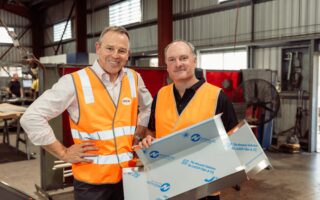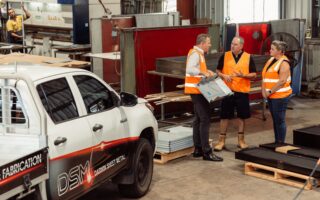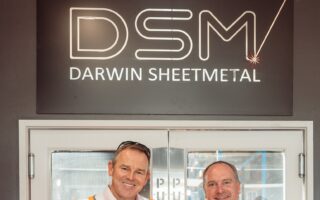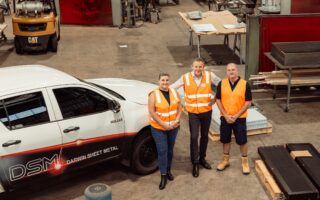Territory manufacturer’s out of the box housing solution to grow local prosperity
Welding and fabrication specialist Darwin Sheet Metal and Laser Cutting (DSM) is addressing a need for greater Territory participation in Aboriginal remote housing builds, compelling STEM projects for high-schoolers and greater circularity within manufacturing through a new $4.16 million collaborative project supported by the Territory Government’s Advanced Manufacturing Ecosystem Fund (AMEF).
DSM has developed an innovative manufacturing system for modular, flat-pack stainless steel furniture, integrating unique QR-coded laser technology for digitally guided onsite assembly and digital spare parts reordering. The 18-month project will see DSM adopting a Territory-first Trumpf TruLaser 7000 machine, implementing unique multimedia technology, and lifting the skills and size of its workforce.
The Trumpf TruLaser 7000 is a high-performance industrial laser cutting machine renowned for its superior speed, precision, and efficiency. With advanced automation, powerful laser technology, and rapid processing capabilities, it will help DSM to maximise productivity, efficiencies, and larger batch production of its modular kitchens, pantries, bedrooms and laundries while ensuring exceptional cutting quality across a variety of materials.
DSM will collaborate with Liquid Interactive, which will design the QR-coded laser-etched technology, as well as remote housing specialist WTD Construction which has extensive experience in remote construction projects.
Together, the team will bring DSM’s furniture offering to full commercial reality, able to be produced with high automation and output, and ready to contribute local capability and products to commitments such as the federal government’s $4 billion remote housing program.
The project estimates at least 2,000 near-term opportunities in current remote building programs for its steel furniture. These opportunities will be met by imported products unless investment into local capability such as this occurs to become more competitive.
DSM owner Ashton Simpson said: “The project will actively use local materials, suppliers, and resources to enhance the NT manufacturing ecosystem. By sourcing materials such as steel from local suppliers and collaborating with NT-based contractors and builders like WTD Constructions, the project will reduce reliance on interstate imports, contributing to the growth of the local supply chain.
“DSM will establish a sustainable and lasting business presence in the NT by expanding manufacturing capabilities and positioning ourselves as a leader in advanced, scalable production. With the acquisition of advanced technologies like the Trumpf laser machine and the introduction of new manufacturing services utilising this new technology, DSM will meet growing demand across industries such as defence, construction, and agriculture.”
DSM has also developed a circular use of waste steel, turning waste into a build-your-own push scooter program for high school STEM students. This “DSM Scoot for School” program aims to grow interest in the industry, involve all sexes and skill levels, and promote school attendance and health through exercise.
AMGC’s Director for the Northern Territory, Charmaine Phillips, said: “This project is poised to play a pivotal role in enhancing the manufacturing ecosystem within the NT by creating a dynamic, interconnected network of businesses and stakeholders. Central to this ecosystem is integrating advanced manufacturing technology, elevating production capabilities and setting new standards for regional efficiency and quality.”
The $4,161,151 project is being supported through a $650,098 grant through the Northern Territory Government’s Advanced Manufacturing Ecosystem Fund (AMEF). The project will create an estimated 11 new jobs at DSM in the first three years, as well as $3 million in new revenues, and position DSM to capitalise on opportunities in new sectors
Administered by the Advanced Manufacturing Growth Centre (AMGC), DSM’s project is the fourteenth business to receive co-investment through the AMEF, which was launched in 2021. Across all projects to date, the AMEF has spurred manufacturing activity, which is expected to create over 250 new jobs and generate over $134 million for the Territory’s economy in its first five years.




